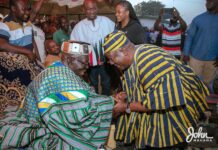By Silas Ewuntomah
The Gonja Kingdom, a beacon of history and tradition in the heart of Ghana, stands at a precipice. For centuries, its rich cultural tapestry has been woven with threads of hospitality, absorbing settler communities who have come to call Gonjaland home. Yet, today, this very spirit of welcome is being tested by an alarming rise in conflicts with these same communities. The source of this tension is no mystery: it is a crisis of land, identity, and governance. The time for ad-hoc solutions is over. A decisive, structured, and forward-thinking approach is not just desirable; it is a matter of survival for the Gonja nation.
The most pressing need is for a clear demarcation of boundaries with neighbouring tribes. Ambiguity is the fertile ground upon which disputes over land and resources grow. Historical claims and modern administrative lines often blur, creating a vacuum that is easily exploited. A government-led, collaborative process to formally and incontrovertibly demarcate these boundaries is the essential first step toward lasting peace. Without this, every other measure is built on shifting sand.
However, defining the territory is only half the battle. We must also define the terms of co-existence within it. The call for formal bylaws binding all settler communities and new settlers is a masterstroke of modern traditional governance. These bylaws would serve as a social contract, explicitly outlining the rights and responsibilities of everyone residing on Gonjaland. They would move relations from the realm of assumed understanding to that of mutual agreement, providing a clear legal and traditional framework for resolving issues before they escalate into violent confrontations.
Central to preserving the kingdom’s identity is the insistence that all names of towns, villages, and new settlements must be in Gonja. A name is not merely a label; it is a claim of ownership, a narrative of history, and a marker of cultural sovereignty. Allowing the proliferation of settlements with names foreign to the land erodes the Gonja identity and creates parallel societies. This policy is not about exclusion, but about ensuring that new developments are integrated into the cultural landscape, not imposed upon it.
Furthermore, the principle that all new settlements must have a Gonja chief is non-negotiable. This ensures a direct line of authority and communication to the Overlord of the Gonja Kingdom. The chief is not just a ruler but a custodian, responsible for the welfare of all within his jurisdiction and for ensuring that the traditions and laws of the land are respected. This structure guarantees that settlers are not stateless entities but are integrated into the traditional political system, fostering a sense of shared community and accountability.
The most volatile flashpoints often revolve around natural resources. The rule that all settlers must be prohibited from mining, hunting, and logging without the permission of the community chief is a critical measure for environmental and economic justice. Rampant, unregulated exploitation by outsiders strips the land of its wealth, leaving the Gonja people with degraded soil and depleted resources. This is not a prohibition on livelihood but a call for regulated, sustainable use. Permission ensures that activities are monitored, benefits are shared, and the environment is protected for future generations.
Finally, and perhaps most ambitiously, all efforts must be made to include all lands and communities of Gonjaland outside the Savanna Region within the Region. This is a call for administrative sanity and cultural unity. The current artificial borders have created a bureaucratic nightmare, fracturing the kingdom’s governance and diluting its political voice. The reunification of Gonjaland under one regional administration is the ultimate step toward effective self-determination, allowing for cohesive planning, development, and the preservation of the kingdom’s integrity.
Critics may label these measures as stringent or isolationist. They are wrong. This is a clarion call for structured integration, not violent expulsion. It is a blueprint for how a proud and historic kingdom can protect its heritage while navigating the complexities of the 21st century. The alternative—continued ambiguity, resource plunder, and cultural erosion—is a path to certain conflict. The Gonja Kingdom has the right to defend its identity, its land, and its future. It is time for the government to listen and for all who reside in Gonjaland to understand: a strong, secure, and well-defined Gonja Kingdom is in the best interest of every single one of its inhabitants.
26.10.2025




